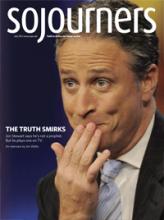The readings this month begin and end with stubborn preconceptions of who Jesus is. First, Jesus’ own community refuses to see past the local boy it once knew, and members close themselves to the work of the Spirit—to the point that Jesus, uninterested in forcing liberation on anyone, must leave. Three weeks later, the crowd has the opposite response. People are so overwhelmed by the freedom he brings—from sickness, loneliness, exclusion, hunger—that they want to crown him king. Frightened by the crowd’s inability to understand that they must participate in the new reign, and thus in their own freedom, Jesus flees in desperation.
In between, the fate of the prophet is made all too clear by John the Baptist’s execution, and we are reminded that our own hands are far from clean when we confront the implications of discipleship in our own lives. The gift and burden of free will means that we can choose how to respond to the good news. Are we prepared, like Jesus, to welcome the lost, forgotten, and excluded, those who hunger and thirst for justice? Are we prepared to shepherd the suffering of the world, and one another?
Though we may not feel up to the task, Paul reminds us that we are not alone in the new and difficult responsibilities of discipleship, for the spirit of the resurrected Christ “at work within us is able to accomplish abundantly far more than all we can ask or imagine” (Ephesians 3:20).
Michaela Bruzzese, a Sojourners contributing writer, lives in Brooklyn, New York.
July 5
Finding Power in Weakness
2 Samuel 5:1-5, 9-10; Psalm 48; 2 Corinthians 12:2-10; Mark 6:1-13
Read the Full Article
